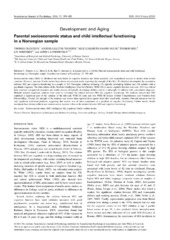| dc.contributor.author | Eilertsen, Thomas | |
| dc.contributor.author | Thorsen, Anders Lillevik | |
| dc.contributor.author | Holm, Silje Elisabeth Hasmo | |
| dc.contributor.author | Bøe, Tormod | |
| dc.contributor.author | Sørensen, Lin | |
| dc.contributor.author | Lundervold, Astri | |
| dc.date.accessioned | 2017-05-24T12:38:47Z | |
| dc.date.available | 2017-05-24T12:38:47Z | |
| dc.date.issued | 2016-10 | |
| dc.Published | Eilertsen E, et al. Parental socioeconomic status and child intellectual functioning in a Norwegian sample. Scandinavian Journal of Psychology. 2016;57(5):399-405 | eng |
| dc.identifier.issn | 0036-5564 | |
| dc.identifier.uri | https://hdl.handle.net/1956/15895 | |
| dc.description.abstract | Socioeconomic status (SES) in childhood has been linked to cognitive function and future academic and occupational success in studies from several countries. However, previous Nordic studies have shown inconsistent results regarding the strength of this link. We therefore investigated the association between SES and cognitive functioning in a sample of 255 Norwegian children, including 151 typically developing children and 104 children with a psychiatric diagnosis. The third edition of the Wechsler Intelligence Scale for Children (WISC-III) to assess cognitive function was used. SES was defined from maternal and paternal education and family income of typically developing children and of a subsample of children with a psychiatric diagnosis. Multiple adjusted regression analyses were used to investigate the relation between SES and cognitive functioning. The analyses showed that SES explained a significant part of the variance of the full-scale WISC-III score and two WISC-III indices (Verbal Comprehension and Freedom from Distractibility). Overall, the strength of the relations was weaker than expected from reports from other non-Nordic countries. Parental education was the only significant individual predictor, suggesting that income was of minor importance as a predictor of cognitive functioning. Further studies should investigate how diverse political and socioeconomic contexts influence the relation between SES and cognitive functioning. | en_US |
| dc.language.iso | eng | eng |
| dc.publisher | Wiley | eng |
| dc.rights | Attribution CC BY-NC-ND | eng |
| dc.rights.uri | http://creativecommons.org/licenses/by-nc-nd/4.0/ | eng |
| dc.subject | Socioeconomic status | eng |
| dc.subject | SES | eng |
| dc.subject | intelligence | eng |
| dc.subject | IQ | eng |
| dc.subject | cognition | eng |
| dc.subject | Nordic welfare model | eng |
| dc.title | Parental socioeconomic status and child intellectual functioning in a Norwegian sample | eng |
| dc.type | Peer reviewed | |
| dc.type | Journal article | |
| dc.date.updated | 2017-05-09T09:25:19Z | |
| dc.description.version | publishedVersion | |
| dc.rights.holder | Copyright 2016 The Author(s) | eng |
| dc.identifier.doi | https://doi.org/10.1111/sjop.12324 | |
| dc.identifier.cristin | 1379797 | |
| dc.source.journal | Scandinavian Journal of Psychology | |
| dc.relation.project | Norges forskningsråd: 228189 | |

